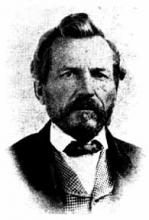You are here
Williams Myers
Though his family wanted him to attend the University of North Carolina, William Myers (1818-1901), born in Anson County, chose instead to go Texas and join the army in 1837.
He settled in Charlotte in 1843 and was elected to serve as solicitor of the county court, on the city commission, in the House of Commons (1854-55), and the state Senate (1856-57). Myers initially opposed North Carolina's secession during the Civil War, but later supported the move to break away from the Union. He volunteered and was made captain of Company G, 34th NC Infantry. As was customary for officers, he was known after the war as Colonel. His lavish home was a safe haven for those who fled Richmond, the Confederate capital, when it fell to Union forces in 1865.
Myers helped promote the importance of railroads and transportation as methods to bring commerce to Charlotte. He helped organize St. Peter's Episcopal Church and the Charlotte Female Institute, which later became Queens College. In 1867 he gave eight acres of land to Biddle Institute (now Johnson C. Smith University). His wife was Sophia Springs; they had eight children. Myers is buried in Charlotte's Elmwood Cemetery.
